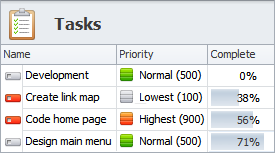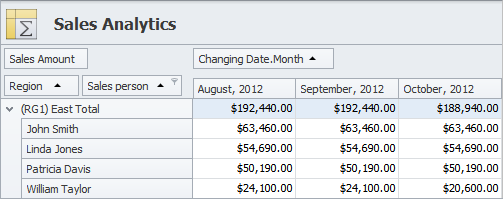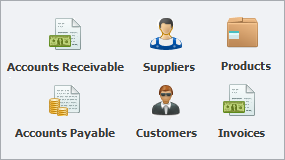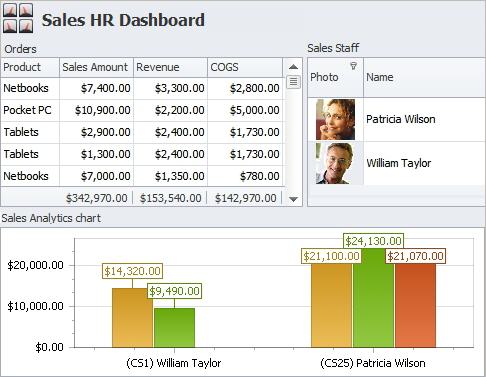Small Business ERP Software for Planning and Accounting
Running a business takes a lot of time and effort. Small business owners have to manage all aspects of their companies - from lead generation and customer relationships to task management and budgeting. Small business ERP makes it easier for companies to run their business efficiently. It offers a mix of tools and solutions that simplify and accelerate the planning, coordination and accounting of small business resources.
Effective Resource Planning
Every business starts with effective resource planning. When you begin to plan the need for resources in your business environment, first you investigate each business activity and analyze your company's past performance. Then you can create a plan that lists required resources, their types and amounts. Basically, all the resources are divided into operational and financial, so your ultimate goal is to make sure that the financial performance and the operational performance of your firm are aligned with the plan. Ideally, each resource should be used according to your custom business solution to ensure higher profits and fewer risks.
Tasks View for Resource Planning in CentriQS Database
CentriQS small business ERP solution helps you address this goal. It enables you to keep all records on your inventories, HR, finances, and resources in one database and to account all changes made to your database. The Tasks view in CentriQS helps you formulate detailed plans that achieve optimum balance of needs with available operational and financial resources. Your plans will be based on estimates of resource consumption and performance reports for last according periods.

Coordination Process
As part of small business management, the coordination process aims to synchronize and integrate the business activities with each other in order to ensure that a company's resources are allocated and used efficiently in pursuit of the business objectives. In this regard, by coordinating the business activities in your organization, you boost the operational and financial performance and ensure right resource allocation. Besides, the sales activity - which is one of the most prioritized processes in business - will require you to reach a close coordination of personnel, equipment, tools, and techniques to gain more prospects and satisfy more customers.
Sales Analytics for Better Coordination
The coordination process is carried out for all types of business activity to deal with waste of resource and effort. For example, coordinating the sales activity involves analysis of current sales results to determine which sales reps or stores bring higher/lower revenue and so should be used as prioritized sales channels in the future. Then other relating activities (advertizing, contracting, accounting, etc.) should be synchronized and integrated with the sales activity. For example, in CentriQS you can use Sales Analytics to analyze your monthly revenues per salesperson per region. The analytic report will help you determine revenue earned per sales rep and determine regions with the highest revenue rate.

Accounting ERP
The implementation of enterprise resource planning systems in small business causes a great effect to accounting processes. Accounting ERP solutions replace traditionally information systems and create sources of integrated data for new, more effective accounting practices. Personnel can collect and analyze accurate data required for performing their routine activities. Moreover, small business ERP provides complete integration of all business activities and creates a single enterprise-wide database, so accounting employees can access and communicate any piece of business information in real-time.
CentriQS Small Business ERP
In particular, accountants can use the Accounts Payable view and the Accounts Receivable view in CentriQS database to keep track of records on unpaid bills and unpaid sales. They can also navigate through the database to view and analyze information on clients, suppliers, orders, invoices, projects, sales, and so on. Even if the database is rather large and includes a great pool of data, the navigation capability of CentriQS makes it easier for accountants to access and update needed information in a faster and more flexible way.

Client Order Management
Customer satisfaction cannot be reached without effective client order management. Managing client orders involves receiving, solving and tracking purchase requests for a company's products or services. When you work on doing the order fulfillment process you have to deal with product information, inventory availability, vendor contracts, clients and prospects, finance analytics, reports, etc. Having all this information displayed in one dashboard will simplify the process and help you reach effectiveness.
Order Data in One Dashboard
ERP for small business allows companies to plan and track all stages of client order management, from the time a client service rep receives a new order until the loading dock ships the merchandise and the finance analyst submits an invoice for payment. When all information on past, current and future orders is kept one centralized system (rather than scattered among different systems which don't communicate with each other), you can easily control your client orders and supervise inventory, delivery and payment right from your desktop. For instance, CentriQS ERP system provides a dashboard capability that enables you to keep track of your customers, purchases, invoices, tasks and other "entities" that relate to managing your client orders.
HR Information
Many companies suffer from lack of a simple unified method for retaining and managing HR information, including employees' profiles, time, wages, benefits, etc. Some of them try to use traditional information systems to keep track of their employees, while others often use several or more solutions to manage human resources, for example one solution is to retain personnel profiles, another one is to track employee tasks, etc. Both groups of the companies fail to reach HR efficiency, because traditional information systems allow dealing with routine only, and multiple solutions do not provide an integrated view of business activities.

Small business ERP like SAP or Oracle keeps all HR information in one database that allows HR departments to access and change specific employee data. It enables personnel management (incl. employee profiling, recruitment, salary administration), payroll process (incl. salary calculation, statutory reporting, tax deduction), time planning (incl. time logging, task scheduling, event planning), and other opportunities for better organization of HR data. For instance, CentriQS lets you create multiple related views to account and keep track of all employee-related records, including sales orders, performance, profiles, tasks, working hours, schedules, projects, wages, etc.
Prev.: Enterprise Resource Planning Software: SAP vs Oracle Comparison || Next: Small Business Inventory Software Functions and Benefits
Next steps
{
Check out CentriQS FEATURES & SCREENSHOTS
Watch 7-minute CentriQS VIDEO OVERVIEW
Learn how to use CentriQS in KNOWLEDGE BASE
DOWNLOAD CentriQS 30-day Free Trial Version
CONTACT US to get help with CentriQS Database Design & Configuration